2008: Spain deliver at last
The 2008 UEFA European Football Championship, commonly referred to as Euro 2008, was the 13th UEFA European Football Championship, a quadrennial football tournament contested by European nations. It took place in Austria and Switzerland from 7 to 29 June 2008. The second jointly-hosted edition in the competition's history, the tournament was eventually won by Spain, defeating Germany 1–0 in the final; becoming only the second nation to win all their group stage fixtures and win the European Championship itself; an accomplishment matched by France in 1984. Spain were also the first team since Germany in 1996 to win the tournament undefeated.
Fernando Torres struck the winner against Germany in Vienna as Spain finally came good on their promise at UEFA EURO 2008, with Luis Aragonés's side demonstrating they had guts as well as talent.
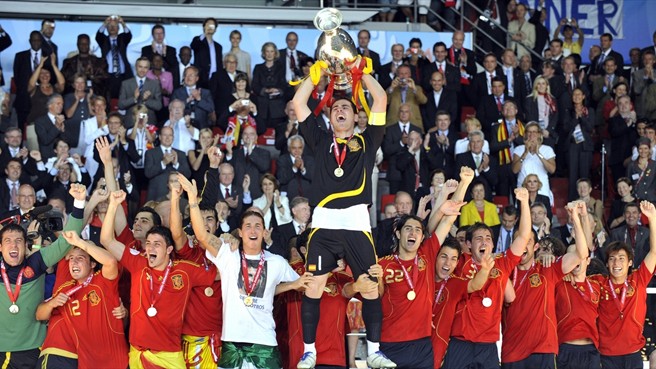
Spain's triumph was their first since the 1964 European Championship
Spain's 44-year wait for a trophy came to an end at UEFA EURO 2008™ as Luis Aragonés's side defeated Germany 1-0 to deservedly win a competition they had taken by storm.
Fernando Torres provided the killer blow in the final, darting past Philipp Lahm before shooting beyond the advancing Jens Lehmann to spark Spanish celebrations. The Furia Roja had achieved what their predecessors had so often failed to do: deliver on their potential. Their success was, in large part, due to Aragonés who had fostered a harmonious atmosphere in a squad blessed with talent. They dazzled with pace, passing and power en route to claiming their country's first title since the 1964 UEFA European Championship.
If midfielders Xavi Hernández and Andrés Iniesta controlled Spain's rhythm with their speed of thought and distribution, it was strike pair David Villa and Torres who supplied the cutting edge. Spain had signalled their intent from the off, beginning the Group D campaign with a 4-1 victory over Russia.
Villa, who would finish as the tournament's top scorer, struck a hat-trick. He and Torres were on target again as Sweden were edged 2-1 before holders Greece fell by the same scoreline. While those three wins set Spanish pulses racing, optimism really turned to belief when the team saw off world champions Italy on penalties to reach the semi-finals.
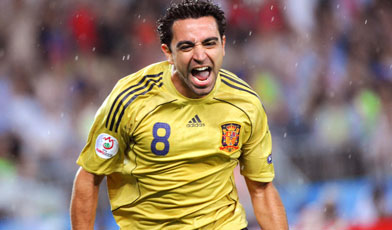
Spain were not the only side to impress in a competition where attack dominated defence. The Netherlands had stunned Italy 3-0, then 2006 FIFA World Cup finalists France 4-1 in successive Group C matches as Marco van Basten's men made light work of illustrious opponents.
The Oranje, however, were beaten at their own game in the last eight as Guus Hiddink's Russia, inspired by Andrei Arshavin, ran out 3-1 victors after extra time. Their surprise run, though, was cut short in Vienna where Spain confirmed their place in the final with a 3-0 triumph.
Host nations Switzerland and Austria both bowed out in the group stage, but neighbours Germany made themselves at home. Joachim Löw's charges started well enough with a 2-0 win against Poland, yet a defeat by Croatia in their subsequent Group B game heralded a tense finale against Austria, in which they prevailed 1-0.
If Germany had struggled to hit top gear, they certainly found their stride against Portugal in the quarter-finals – jumping into a 2-0 lead within 26 minutes before emerging as 3-2 winners. More drama followed in the last four as they outlasted Turkey by the same scoreline.
Fatih Terim's team had illuminated the tournament with successive last-gasp victories over Switzerland, Czech Republic and Croatia to make the semi-finals. In Basel, however, it was their turn to endure the heartache as Lahm netted in the 90th minute to send Germany through. Lahm's joy proved short-lived.
The left-back appeared to have Xavi's pass covered when the midfielder sought out Torres 33 minutes into the Vienna final, yet as so often during a memorable month for Aragonés's side, the Spanish player mastered the situation to make a decisive and winning contribution.
Result
| Final | |||||
| Germany 0-1 Spain | |||||
| Semi-finals | |||||
| Germany | 3-2 | Turkey | Russia | 0-3 | Spain |
| Quarter-finals | Quarter-finals | ||||
| Portugal | 2-3 | Germany | Croatia | 1-1 | Turkey (agg 1-3) |
| Quarter-finals | Quarter-finals | ||||
| Netherlands | 1-3 | Russia | Spain | 0-0 | Italy (agg 4-2) |
| Group stage | |||||
| Group A | Group B | ||||
| Switzerland Portugal Czech Republic Switzerland Switzerland Turkey |
0-1 2-0 1-3 1-2 2-0 3-2 |
Czech Republic Turkey Portugal Turkey Portugal Czech Republic |
Austria Germany Croatia Austria Poland Austria |
0-1 2-0 2-1 1-1 0-1 0-1 |
Croatia Poland Germany Poland Croatia Germany |
| Group C | Group D | ||||
| Romania Netherlands Italy Netherlands Netherlands France |
0-0 3-0 1-1 4-1 2-0 0-2 |
France Italy Romania France Romania Italy |
Spain Greece Sweden Greece Greece Russia |
4-1 0-2 1-2 0-1 1-2 2-0 |
Russia Sweden Spain Russia Spain Sweden |
UEFA Team of the Tournament
| Goalkeepers | Defenders | Midfielders | Forwards |
| Gianluigi Buffon(Italy) Iker Casillas(Spain) Edwin van der Sar(Netherlands) |
José Bosingwa(Portugal) Philipp Lahm(Germany) Carlos Marchena(Spain) Pepe(Portugal) Carles Puyol(Spain) Yuri Zhirkov(Russia) |
Hamit Altıntop(Turkey) Michael Ballack(Germany) Cesc Fàbregas(Spain) Andrés Iniesta(Spain) Luka Modrić(Croatia) Lukas Podolski(Germany) Marcos Senna(Spain) Wesley Sneijder(Netherlands) Xavi(Spain) Konstantin Zyryanov(Russia) |
Andrei Arshavin(Russia) Roman Pavlyuchenko(Russia) Fernando Torres(Spain) David Villa(Spain) |
UEFA Player of the Tournament
Xavi(Spain)
UEFA Tournament Golden Boot Award
David Villa(Spain)
Venues
| Vienna | Klagenfurt | Salzburg | Innsbruck |
| Ernst-Happel-Stadion | Hypo-Arena | Wals-Siezenheim-Stadion | Tivoli Neu |
| Capacity: 53,295 | Capacity: 31,957 | Capacity: 31,020 | Capacity: 31,600 |
 |
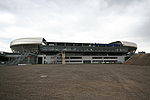 |
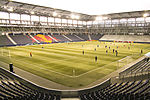 |
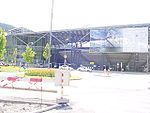 |
| Basel | Bern | Geneva | Zurich |
| St. Jakob-Park | Stade de Suisse | Stade de Genève | Letzigrund |
| Capacity: 42,000 | Capacity: 31,907 | Capacity: 31,228 | Capacity: 30,000 |
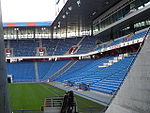 |
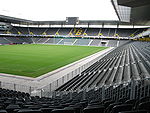 |
 |
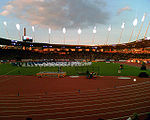 |
photos
| Ranking | Player | Country | GS (PEN) |
- Year
- Winners
- Runner-up

